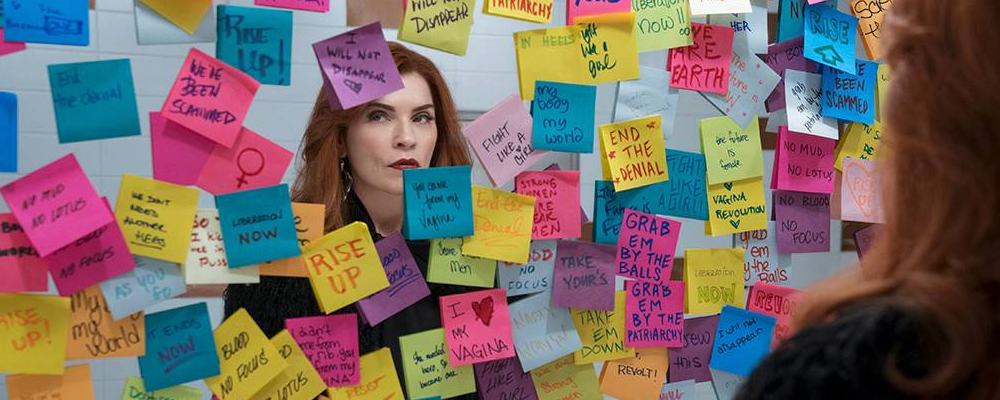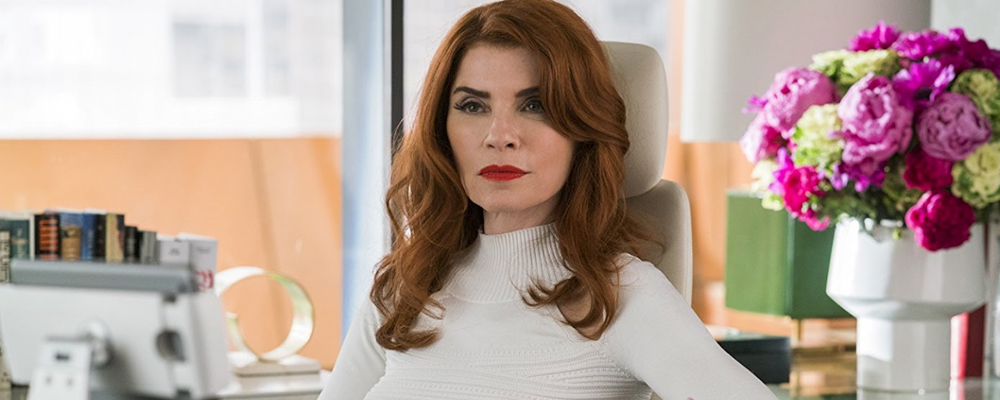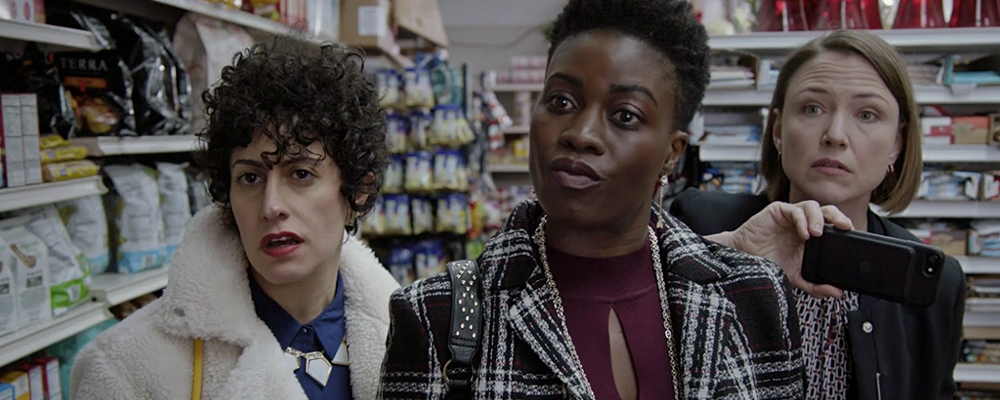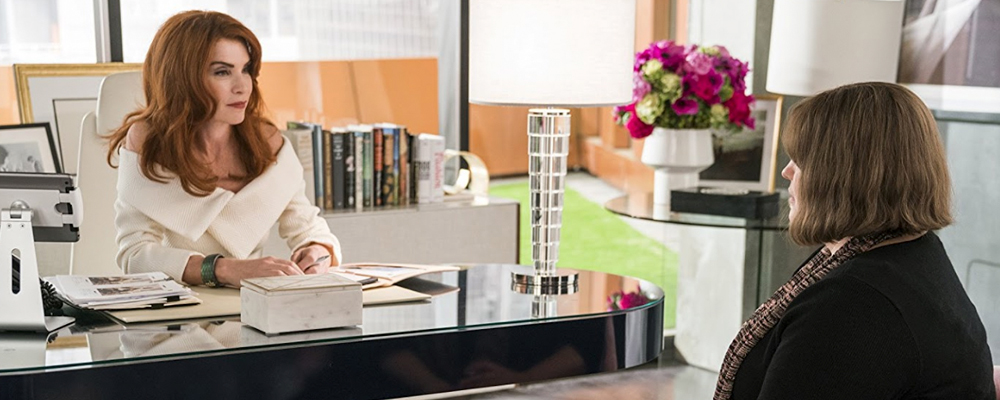AMC’s ‘Dietland’ Takes Aim at Body Shaming Culture With Sharp Satire
Alci Rengifo
“Dietland” is a TV version of pop guerrilla war. With the sharp blade of satire it wants to tackle our obsessive, discriminating body image culture. There is no denying this show is relevant. It understands the language and social habits of a society obsessed with its looks. Based on a satirical novel by Sarai Walker, the gargantuan 2-hour series premiere jumps through different narratives. The central story is that of Plum Kettle (Joy Nash), who has struggled all her life with being overweight. Plum becomes a walking heroin for everyone who has felt left out of the treadmill-running, avocado toast-munching fitness culture now in vogue. Beyond that, the story also seems to hint that maybe urban warfare is the only solution to the problem of sexual harassment and abuse women endure at the hands of men who get away with it. This is bold stuff, and even when it feels messy it keeps you pulled in.
Plum works for a glossy magazine named Daisy Chain, which, as she puts it, essentially prepares women to be perfect, hot wives. The chief editor is Kitty Montgomery (Julianna Margulies), who uses Plum as her ghost writer to reply to fan mail. Kitty can barely hide the fact that she, perfectly slim, looks down on morbidly obese Plum. It isn’t as if Plum is not making an effort. She is currently on a diet program so she can lose enough weight to get her stomach stapled, but since childhood it has never been easy to just shed a few pounds. Working in the fashion world, it doesn’t help her self-esteem to be surrounded by people obsessed with looking perfect all the time. Plum is soon approached by a gothic-looking girl named Leeta (Erin Darke), who gives her book titled “Dietland.” Leeta is associated with Julia (Tamara Tunie), who runs Daisy Chain’s beauty closet. Julie is also part of some kind of underground operation seeking to take on the culture of body shaming and harassment. She asks Plum to sneak over the names and emails of the women who have written to the magazine, sharing their own stories or rape and shaming. Plum goes for it and slips Julia the information. Plum also finds herself seeking Verena (Robin Weigert), the author of the “Dietland” book, who runs a group encouraging people to accept themselves as they are. But in the night an armed group calling itself “Jennifer” is carrying out attacks on men accused of harassment and rape, leaving violent calling cards as a wake-up call.
Good satire will make you laugh, but it always comes with a sharp bite. From Juvenal to Gore Vidal, satire is supposed to make us uncomfortable, like gazing straight into a mirror. “Dietland” can have that effect in the way it deals with body image issues. There is no softening or romanticizing Plum, she clearly states she feels like a brain trapped in a body. She is cat called by jerks on the street, and admits to Verena that she’s still a virgin. The way the writing deals with our cruelties and insecurities can be stark and hurtful. Animation sequences take us inside Plum’s inner thoughts. She has a crush on a detective named Dominic (Adam Rothenberg), who is called in to investigate certain happenings at Daisy Chain. He seems to be genuinely friendly and kind, but then she imagines herself as the kind of person made to never have a relationship, family or lover, unlike the “normal” inhabitants of slimville. We never see this on mainstream television, because most shows want to cater to what media tells us is an attractive image. “Dietland” understands that there are people wandering around everyday feeling ugly, bombarded by constant imagery making them feel this way. Plum finds herself in an elevator with models visiting the magazine, her eyes can only look up at the ceiling, because she feels caged in. Over the phone even Plum’s mother tells her bluntly, “I wish you could see yourself the way others do.”
The sections dealing specifically with how Plum feels and operates are the best in the season premiere. The neo-dystopian, guerrilla army material is still somewhat formless and it will probably take more episodes to get a full picture. It is not very clear exactly who the victims of Jennifer are, or what they even did, except for a few snippets of dialogue. This is the introductory phase, but the idea itself is intriguing, especially since the guerillas don witch-like masks when they carry out an operation. The metaphor itself is provocative in the sense that it seems to imply that mere hashtags and condemnations won’t do much to protect women’s rights, radical action is needed.
In satire the style of the performances makes or breaks the material. Julianna Margulies gives lessons in the proper way to play a Medusa. Her delivery is matter of fact and condescending. Her character is a caricature of the fashion editor stereotype, but she doesn’t play it with awareness. Kitty is serenely venomous because this is just her nature. Joy Nash on the other hand has created a new heroine who is admirable for embodying the modern person bombarded by life itself. Her boss is somewhat of a monster, she is self-conscious to a crushing degree, and the world is quite simply just not nice. Her trials and tribulations are our own, in our own ways.
There is something somewhat comforting about watching a show like “Dietland,” because it feels in touch with how many people actually feel. When it comes to women, it gives specific voices a dramatic platform excluded from even other, admirable and socially consciousness programming. But this is comedy and drama that also avoids pessimism. Plum begins to realize that there is more to life than how we look. When this show works it gets its revenge on the beautiful people, not with bitterness, but with a smile.
“Dietland” season one premieres June 4 and airs Mondays at 9 p.m. ET on AMC.





